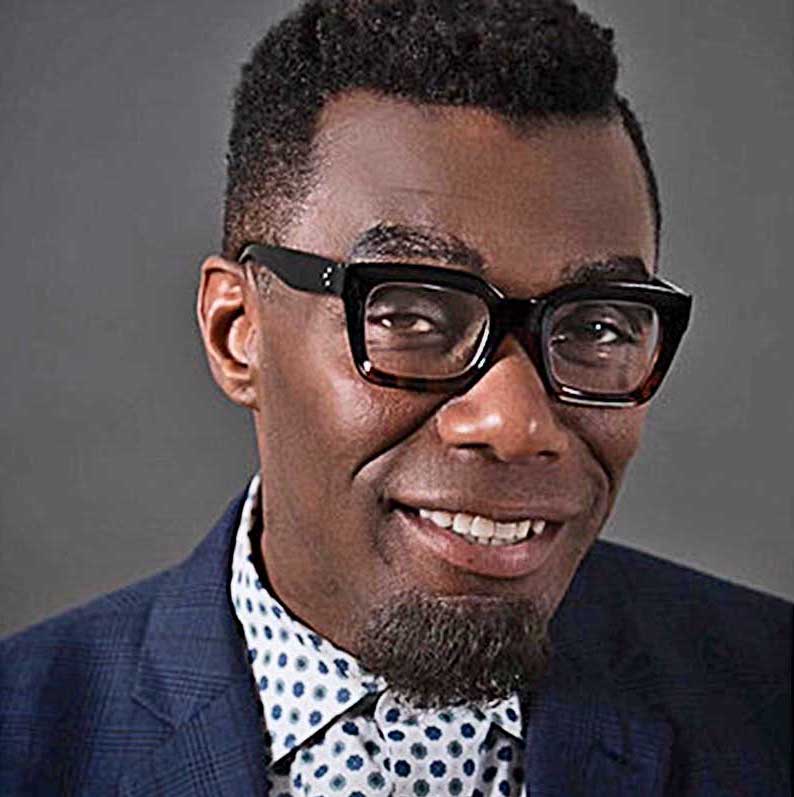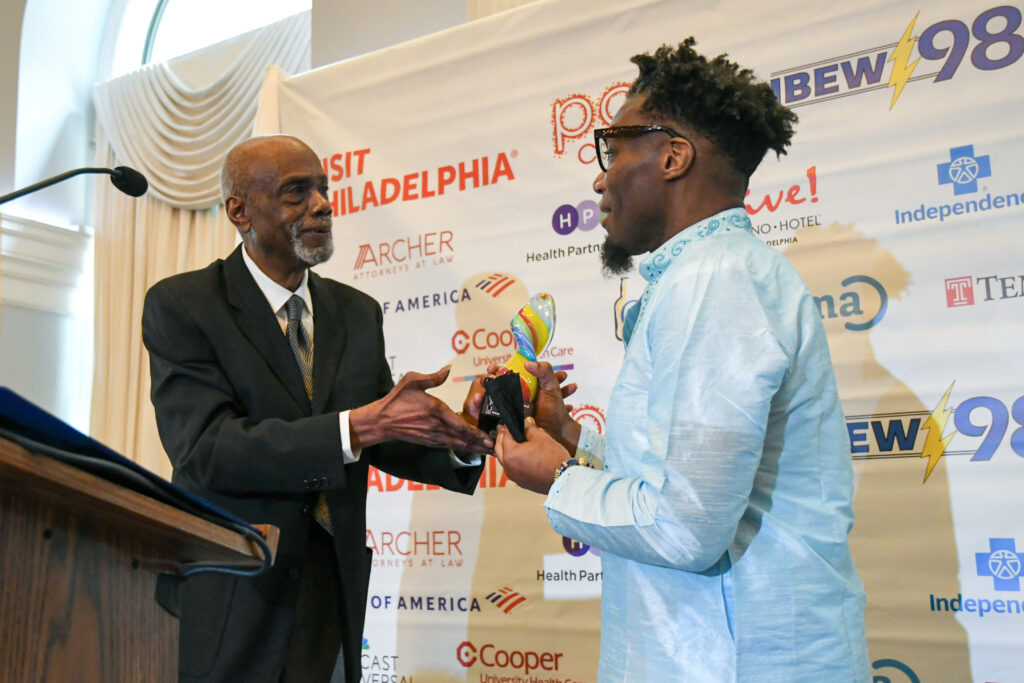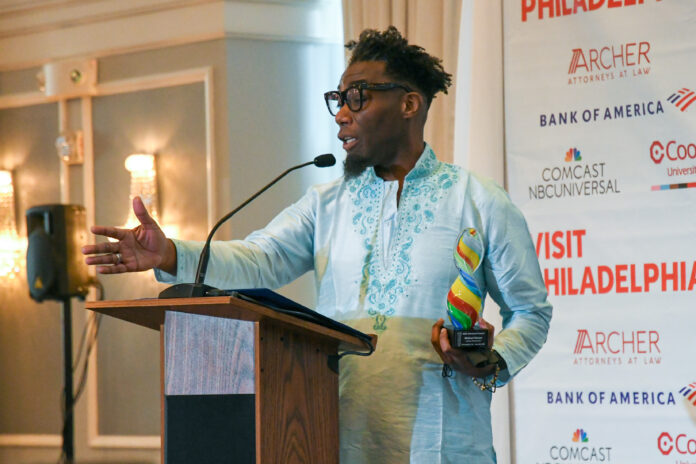“Mike was one of those people who always spoke up for the funding that was always disproportionate for Black, gay men with HIV,” said José de Marco of their friend Mike Hinson, who passed away in August 2022 at the age of 55. Hinson, a long-time activist for LGBTQ and Black and Brown communities in Philadelphia, dedicated his life to fighting for marginalized communities and helping them get housing, access HIV care, and live free of discrimination.
De Marco, an Afro-Latinx queer activist, met Hinson through their involvement with HIV service and advocacy work in Philadelphia. Years ago, de Marco worked for We the People, the first and only HIV/AIDS service organization run by people living with HIV, where they recall Hinson being a board member. Hinson later asked de Marco to work for COLOURS, the HIV/AIDS service organization that he founded in 1994.
COLOURS, which grew out of a magazine that Hinson co-created to share information about HIV in the early days of the epidemic, served everyone, “but it was specifically focused on Black and Latinx folks that were dealing with a lot of marginalization and injustice when it came to HIV funding,” said de Marco, who went on to found Black and Latinx Community Control (BLCC), a committee of Black and Brown LGBTQ people working to end HIV infections and regain control of healthcare in their communities. “During that time, we could go to other organizations, but there weren’t people who looked like us or understood us. Mike saw that we needed an organization that serves our community by people who look like us and come from our neighborhoods.”

LGBTQ activist Kendall Stephens met Hinson through BLCC, and found a mentor in him.
“[Mike] was just a force to be reckoned with,” Stephens said. “Even though he had a kindness to him and a very poised manner, Michael, at times, would command attention. There’s a time to be pleasant and engage in respectability politics, and there’s a time to operate your voice and your visibility to its maximum effectiveness. And if that meant that people were going to have hurt feelings, Michael didn’t really mind, as long as we were alerting these people in power that our communities were suffering as a direct or indirect result of their efforts, or lack thereof.”
Hinson is the reason that Stephens now works for Big Brothers Big Sisters Independence, a youth mentoring organization. He once told Stephens that you don’t choose to do advocacy work, that it chooses you, she said.
“That is so true,” Stephens said. “Advocacy for many LGBTQ+-identified people, especially those of color, is a rite of passage for us. Existing is tied very deeply to advocacy and activism. We know that through the nexus of community engagement and outreach is the possibility of liberation for us.”
In being attuned to the needs of young Black queer people in Philadelphia, Hinson formed what would become the primary program of COLOURS, according to his friend and mentor David Fair, who also did substantial work in HIV/AIDS and housing in Philadelphia. Fair considered Hinson a mentor in many ways. In the 1990s, when COLOURS was new, it was common knowledge that on 13th Street, Washington Avenue, Frankford and Allegheny avenues in Northeast Philadelphia, very young Black and white young gay men, as well as trans kids, were engaging in survival sex work.
“Even in the more established white gay community, there wasn’t a whole lot of attention paid to young people,” Fair said. “The feeling, I think, among a lot of white gay men, was that too many [of them] were the customers of these teenage gay people, white and Black. Michael early on recognized that a lot of the teenagers who were selling their bodies were Black.”
As part of COLOURS, Hinson created a support group for young Black queer people like the kids who resorted to surival sex work.
“So many of these kids were just desperate for somebody to pay attention to them,” Fair said. “Somebody to help them out of this morass that they were living in, somebody to care about them in a way that they weren’t getting from their jobs [or] from their families who in most cases, had thrown them out for being who they were. Michael provided a safe place for them.”
Hinson’s community work by no means stopped there. In 2002, when Mayor John Street was in office, Hinson fought to make gender identity a protected class under Philadelphia’s Fair Practices Ordinance. Street appointed Hinson as his liaison to Philadelphia’s LGBTQ communities, where he advised the mayor on issues ranging from child welfare, education and homelessness.
“In that job, [Michael] really believed that every city department should be serving LGBT people effectively,” said William Way Executive Director Chris Bartlett, who was friends with Hinson and collaborated with him on HIV and LGBTQ-related work.
Hinson would go from department to department, Bartlett said, from behavioral health to the library system, to see how they could improve their service to the LGBTQ community. Research and data also guided Hinson’s decisions on how to distribute funding and where to push for services. He funded the first LGBTQ census, which Bartlett led with Heather Batson.
“We made use of data about married couples in the census, that enabled us to say some things about queer families,” Bartlett said. “We generated a report first on adults and then on young people. That research became fundamental for: where are the communities and what are the needs?”

When Hinson was working with Mayor Street, he asked Hinson to assist in devising a 10-year plan to end homelessness in Philadelphia, a project that got put on the back burner after Street left office. But the work continued nonetheless.
Hinson brought his experience in housing and community work to his job as chief operating officer of the housing organization SELF, Inc. When he was applying for a job at the organization, it functioned as an antiquated shelter that provided three meals a day and a cot to sleep in at night. A debate back then, which still continues in today’s homeless service system, was whether to quickly get people off the street and process them through the homeless shelter system, or to do a housing first approach where people experiencing street homelessness are given a place to live first and then connected to resources.
When Hinson interviewed at SELF, he told the staff that he thought it necessary to carry out both approaches to mitigating homelessness in Philadelphia. Today, SELF has a permanent housing program called SELF+ Cooperative.
Rhashidah Perry-Jones, communications, diversity and government relations consultant who formerly worked with Hinson at SELF, underscored Hinson’s dedication to serving people experiencing homelessness and trauma.
“He just ingrained in a team this belief and this kind of accountability that people experiencing homelessness and people who may have been marginalized deserve the very best,” Perry-Jones said. “And that with all the trauma some of our participants had experienced, he said that it is an honor to be able to be helpful and of service to them.”
Another SELF program that developed under Mike Hinson’s leadership is the Way Home Rapid Rehousing program, a collaboration with William Way LGBT Community Center created specifically for LGBTQ folks experiencing homelessness. When possible, it focuses on Black trans folks.
Dr. Shirlana Dash, the current COO of SELF, did not know Hinson but came into her role knowing about his legacy and wanting to perpetuate it.
“Mike’s work at SELF strengthened the organization in that he worked from a very collaborative team approach, believing that together they were able to achieve more and do more,” Dash said. “He was a great man, the legacy he built was built on love. One person alone cannot do anything, but it is a team that moves things forward. I believe that’s what he exemplified, that the team moving forward can create great change.”
To honor Hinson’s legacy, the Michael Hinson Resource Center, also a program of SELF, opened in North Philadelphia in October of 2022. There, people experiencing homelessness can go and get something to eat, take a shower, and get connected to housing services. Overnight, it serves as a temporary shelter for men experiencing homelessness.
Beyond the governmental, housing, and healthcare work Hinson did, he was passionate about art, loved to dance, enjoyed bead-making and baking, and was active in the Yoruba religion.
“He had so many different facets,” Perry-Jones said. “He brought all that love to SELF, and one of the things we really connected upon was this belief that the arts are such an important contributor to people’s quality of life, and being able to have access to it.”
For the people utilizing their services, the SELF team would hold arts programs featuring African dancers, artists and painters. They facilitated a project at William Way called theatrical combinations, Perry-Jones said, which gave participants a chance to write monologues, create art and “perform their truths.”
Perry-Jones and Bartlett, like many who knew Hinson, said they still feel Hinson as a guiding force in their lives.
“He was a huge inspiration to me, and I learned so much,” Bartlett said. “I’m just still deeply saddened that I don’t get to call him every day and run ideas by him. But I believe in ancestors, and I definitely feel his presence and hear his voice when I’m trying to decide what to do.”
